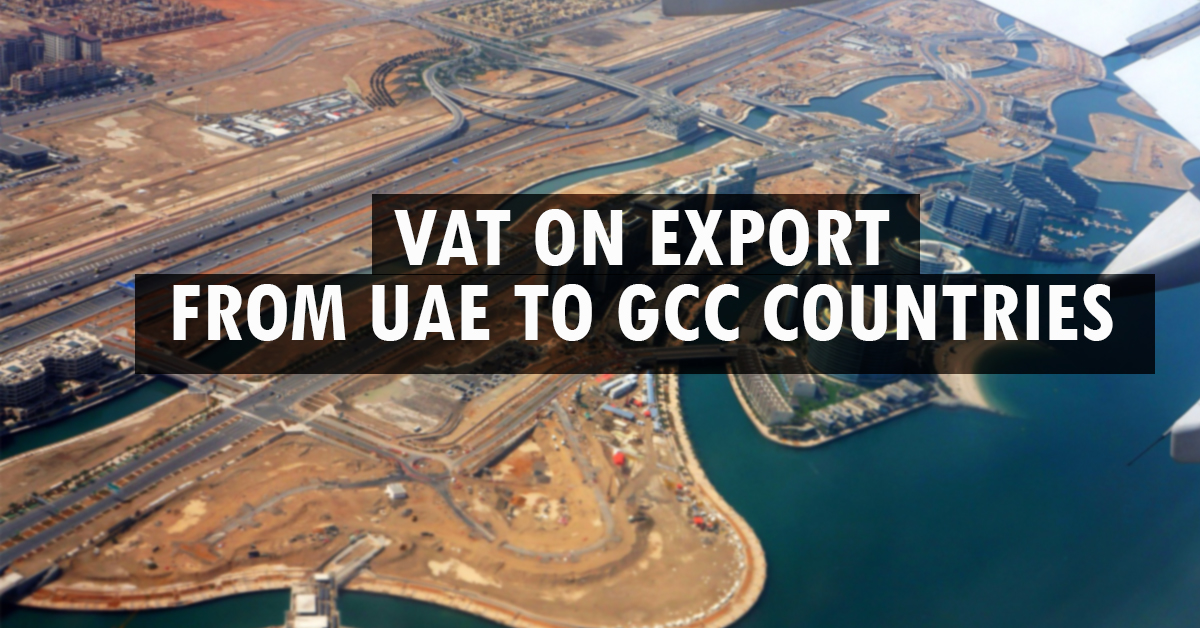VAT on exports from UAE to GCC countries: Not all the states included in GCC have implemented VAT on their exports. Two GCC states have implemented VAT in recent years, the UAE, and Saudi Arabia. So, VAT on exports from UAE to GCC countries varies depending upon the applicability of VAT in the destination country.
VAT On Exports From UAE To GCC VAT Implementing States
The only country other than UAE is KSA which implements VAT on their exports among the GCC states. KSA has its own set of rules and regulations to implement VAT on its export system to generate maximum revenue.
So, VAT on exports from UAE to Saudi Arabia follows the complement of rules and regulations.
There are two scenarios regarding the applicability of VAT on export from UAE to the VAT implementing countries.
- When the recipient is registered under VAT in the destination country.
- In case when the recipient is not registered under VAT.
Then the recipients and suppliers must be searching for some basic queries like:
- What is the amount of VAT for a registered recipient?
- In the case of an unregistered recipient in the destination state, is it mandatory to maintain the value of exports and trades below the required registration threshold in the destination country?
There are three main points available in the VAT laws of FTA that will solve your queries.
- For a recipient registered under VAT in the destination country, it implies Zero-rated VAT under the UAE VAT laws.
- Suppose the supplier is exporting to an unregistered recipient. The value of his exports to the destination country is not more than the required registration threshold of the same country. In that case, FTA implies a standard VAT rate, i.e., 5%.
- Now have a look at the scenario when an exporter in the UAE supplies goods of value more than the mandatory registration level of the destination state. In this case, the supplier has to register himself under VAT in the destination country.
Moreover, the supplier will charge the recipient VAT at applicable rates. The supplier needs to arrange all the transportation and courier issues. Most of the time, the suppliers hire an agent to perform the required task.
VAT On Exports From UAE To Non-GCC VAT Implementing States:
Those GCC states that do not implement VAT on their trading system are termed Non-GCC VAT Implementing States. In addition, the export regulations from UAE to that country will be different from the VAT implementing states.
There are two types of exports while trading with a Non-GCC VAT Implementing State.
- Direct Export:
The supplier arranges the whole process by direct exporting from the UAE to another state. Starting from transportation and courier services, he manages everything or hires an agent to manage the process virtually on his behalf.
2.Direct Export To A Non-GCC VAT Implementing State From UAE:
The direct export to the destination country will be zero-rated in the case of the following two conditions. Apart from that, the government implies a standard VAT rate.
- The goods are exported to the required country physically.
- The exporter needs to provide official evidence of the export to that particular country. Likewise, he provides the recipient with a copy of that evidence.
3. Indirect Export:
While in the case of indirect export, the recipient of the order manages everything, including transportation of goods and receiving of the order. He needs to meet all the rules set by his government regarding VAT to obtain an export from a supplier based in UAE.
4. Indirect Export To A Non-GCC VAT Implementing State From UAE:
Standard VAT rate applies if both the parties don’t follow the following two conditions.
- Exporting goods to the destination country physically.
- The goods are not exported under the possession of any crew member or a passenger of a ship or aircraft.
- Change or replacement of products during the supply is not allowed.
- There should be no fixed establishment or permanent residence of the recipient in the UAE. Besides that, there should be no tax registration number of the recipient in the UAE. Otherwise, he’ll not be able to avail the opportunity of the zero-rated VAT.
- The recipient must obtain official evidence of exporting the goods from the UAE. Moreover, the supplier also needs to get a copy of that official evidence from the recipient.
Final Verdict:
Hence, the VAT on exports from UAE to GCC countries depends upon the destination state you are exporting to. It doesn’t encounter whether that country is a VAT implementing state or not.
The only important thing is if the taxpayers can correctly identify the amount of VAT they have to pay for the required export.
Moreover, the VAT implementation to GCC countries from the UAE follows the rules and regulations. So to be aware of the sensitivity of the export, UAE exporters need to learn the whole system to implement VAT correctly.


